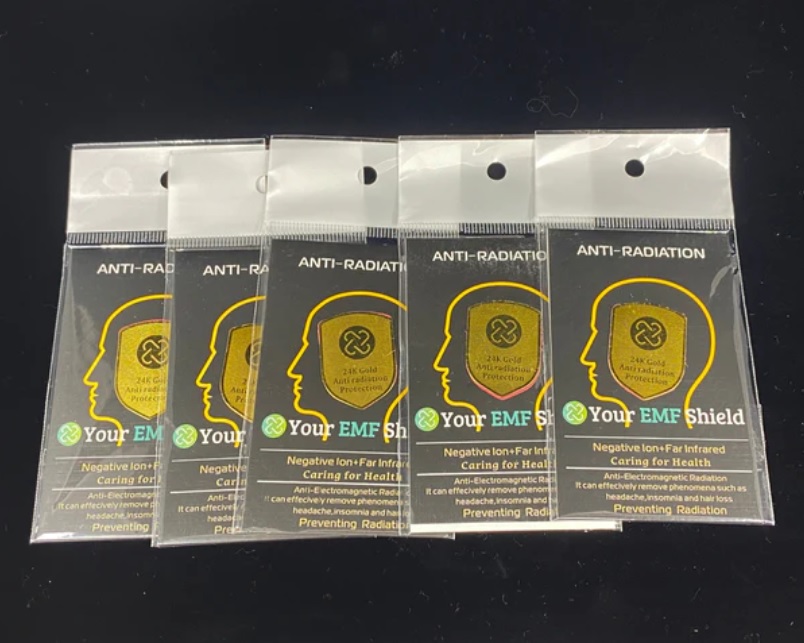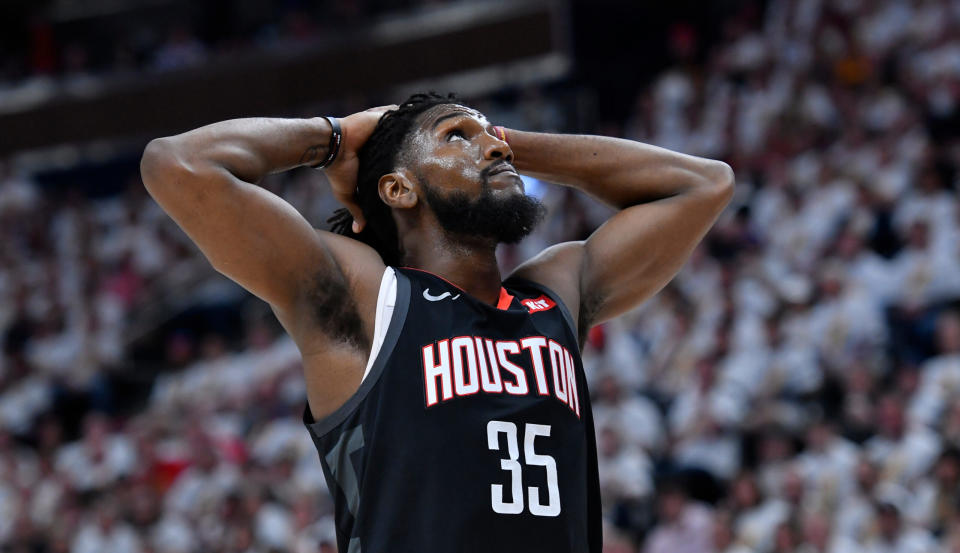
The Manimal, as Kenneth Faried has been known since his days in Denver, has had quite the journey. After eight productive seasons in the NBA and stints overseas including Russia, Puerto Rico, and China, Faried is back south of the border playing for the G League affiliate Mexico City Capitanes.
After joining the Capitanes to help fill the void left by Jahlil Okafor, who was injured in the NBA Winter Showcase, Faried has averaged a double-double in 11 games played. The former Nugget recently spoke with HoopsHype about his experiences outside of the US, his goal of returning to the NBA, and his leadership.
How’s everything going in Mexico City?
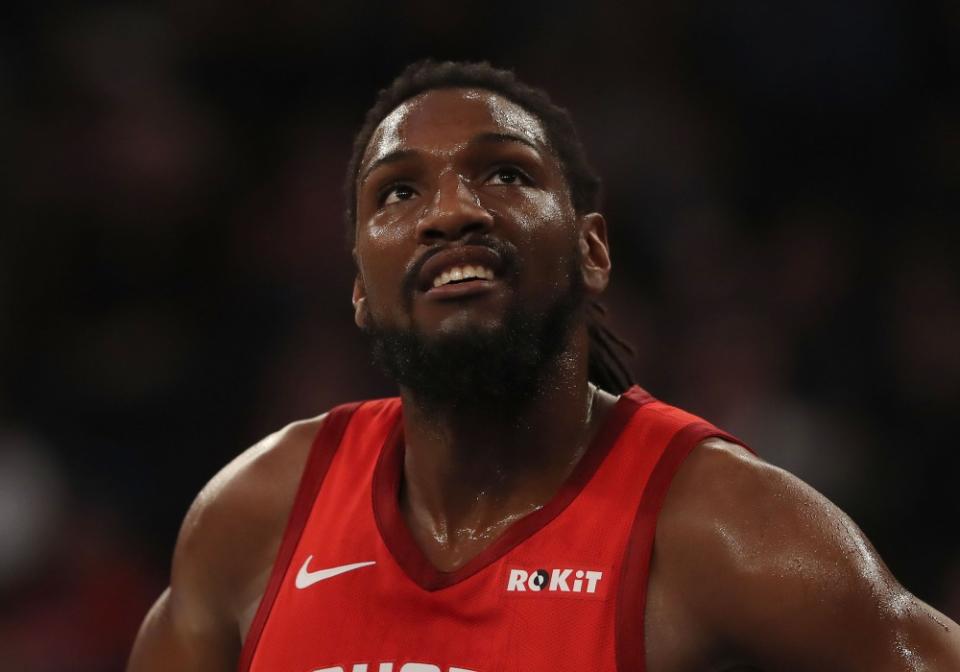
Elsa/Getty Images
Kenneth Faried: It’s amazing. I love being out here, like the atmosphere, the people, the altitude. Starting off in Denver being able to come here now in Mexico City, which is even higher altitude than Denver and Utah… I couldn’t ask for anything better right now in helping me get in great shape. Coaches and everybody are letting me play and letting me be the player that I can be. It’s amazing to have that backing and that help.
How is it like playing with former NBA players on your team like Shabazz Napier, Mason Jones, and Gary Clark?
KF: It’s amazing playing with them guys. Like you said, they played the game before. Some of them I played with on teams like Shabazz in Brooklyn. Gary Clark, we were in Houston together. So for us to now be on a team, and all trying to have the same kind of goal to make it back to the NBA and try to find a way is great, because we’re not trying to be selfish to each other. We’re trying to help each other. And everyone’s here trying to help each other get better, trying to showcase that we’re still good enough in great shape and ready for whatever may happen, ready for a contract for real.
You’ve played with multiple G League teams now. What have you learned the most about playing in the G League compared to the NBA?
KF: I’m that much more hungry to go back to the NBA. Just being honest, that’s the most I’ve learned. I’ve known how to play this game for a long time. It’s teaching me how to be more of a vet, and a leader being in the G League. Honestly, before I used to be kind of quiet, not say much and just kind of let my emotions speak for themselves. I would just go in and work hard, not saying anything to anybody. But that’s not a good thing. That’s not a good way to be a vet. And being in the G League taught me how to [say], “Hey, you know what? Yeah, you go in there, work hard, do all that stuff, but still teach the young guys. Be okay with passing on the knowledge’. And I’m okay with that. I just didn’t know how to do it at the time. And the G League helped me with that.
Playing in Mexico City, do you think the city is a good fit for an expansion team in the NBA?
KF: 100 percent, I do. Of course, I believe that the team itself, we got some things we will work out and they’re gonna be able to work it out. Because now they have that title, NBA stamp on them. It’d be a lot different for them, as far as fans, as far as people wanting to come to Mexico City. It’s not as expensive as America. So you got less money you’re going to spend out here and you get to come out here and watch a great game and the altitude is even higher than Denver. So I believe the players that play here are going to be even more prepared than the players that play in the other nine altitude cities. I think that the players out here that will be playing for the NBA team are going to be way more able to run and do stuff that the NBA likes to see, that fast-paced game.
You mentioned that one of your goals was to play in Europe even just for a short stint. You played in Moscow in 2021 and China in 2019. You were only there for brief times. What was your experience like over there compared to in the NBA?

Matthew Stockman/Getty Images
KF: It was a great experience for me. I liked it a lot. The NBA is more of a player’s league, and these other leagues are more about the coaches. I’ve seen that and I respect that, and I’m not mad about it. I just understand how the game goes now and [the] different leagues in different aspects. Like I said, the NBA is more of a player’s league and guys know how to play the game at that level and it’s so much talent [compared] to overseas and some other places, it’s not as much talent respectfully. But guys played hard, and guys go after it because they’re playing more so for their livelihood more than the NBA, whereas guys may be playing just because, “Oh, tonight I gotta play a game”. More because they may be more talented than the other guys.
What sort of things did you learn overseas that you hope you can bring back to the NBA?
KF: Just being a better vet. Being over there helped me become more of a leader. More of a, “Hey, okay, Coach want this from us? Okay, hey, guys, come on, we gotta go out here work hard. Hey, come on, keep cheering your teammates, keep picking them up”. Even when I was down in moments for myself in the NBA, because I wasn’t playing. And a lot of NBA players go through this, a lot of players go through this in general. But it kept me focused on, like “Hey, you know what, I may not be playing, but I may get an opportunity”. So I’m gonna keep cheering my teammates on, keep working hard, keep standing up to practice doing the little stuff that the coaches want to see. I used to do that stuff, but on my own. But now I learned to do it in front of the coaches more. Before I was more of a [keep] to myself type of person. I came in during 2011 when there was a lockout, and I didn’t have that luxury of having a coach. Then the next year, I had the same coach [George Karl], and he respectfully told us, “I don’t want to see you during the summer. You better come back ready for shape the next year”.
So learning that experience and then having the experience of overseas and seeing how coaches are totally different [there]. They always on you. “Hey, you got to come to practice.” Always calling you, making sure you doing all this extra stuff. “I want you to come in for this.” Not saying that they did that to me, but seeing it to other players is totally different from what I was as a rookie in the NBA.
Did the events of Britney Griner change your perspective on how things were like in Russia when you were there?
KF: Yeah, man, I think back to my stuff, it didn’t change my perspective, in the sense of Russia. Because at the end of the day, it’s their country, it’s their rules. So you gotta abide by what their rules are. And I can’t do anything about that. But at the same token, I went over there, and I got my experience from it, and it was different for me. And at the same token, I wasn’t moving how she was either. I was different. I was on a different team, I was focused on what I needed to do, and I was just doing that.
A lot of the NBA has to do with fit and that alone can dictate how long a player’s career lasts. What sort of advice would you give to younger players trying to make it in the league?
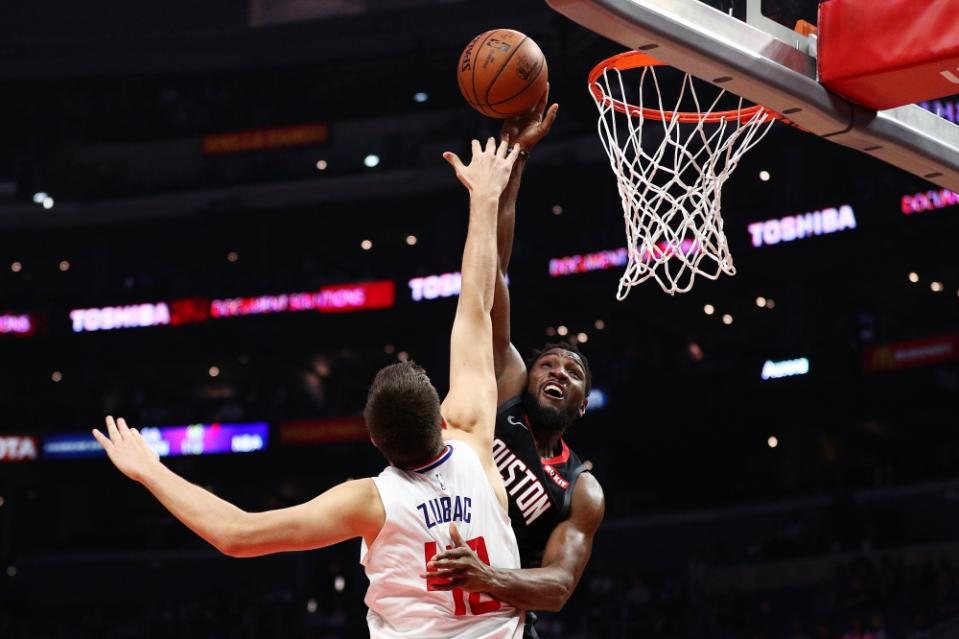
Yong Teck Lim/Getty Images
KF: Honestly, whatever your strengths are, and whatever you got to have the scouts and stuff looking at you… then continue to do that even when you are in the league. Later on, they will expand your game. Like the NBA will make you expand your game because they will have the trainers, the coaches, and everybody coming around you and say, “Okay, we’re going to make your game like this, or we need you to do more of this”.
At the time when I was in the league, I personally didn’t have that because of so many coaches changes and everything. But I was still going to get my own trainers and stuff and train to get better and be prepared for whatever may have happened. When it was my time to be able to shoot the three and that was more so when I was in Houston. The coaches saw how well I can actually shoot it while watching practice and watching me go at it after practice, so they gave me the chance. So in the game, I was able to do that. But at the end of the day, I stuck to what I did, [which was to] continue to be that rebounding machine, be that force defensively, be that lob threat, be that great screener and be that shot blocker that got me paid and got me to continue to stay in the NBA. Then I just added that my last year to three, and I was shooting it well, but things happen in life that you can’t control, so I was out the league the next year.
You last played in 2019 and were pretty effective with CP and James. How difficult has it been for you knowing that you know you can play at this level, but you just haven’t been given the opportunity?
KF: Extremely difficult for myself. At the same time, patience is a virtue. I’m very patient. I’m working hard towards showing that I can still do it at that level. And hopefully being in this great city of Mexico City and being on this team, Capitanes, the experience and the minutes I’ve been getting, I can continue to showcase to the NBA that I’m ready for whatever team wants to hopefully pick me up. Like I said, I’m ready, I’m focused, I’m locked in, I’m a better vet, a better person, a better leader and I don’t even need to be a leader. I can be quiet and sit back and just follow whoever the leader is.
Looking back to your younger self, would you say you were a lot more hungry now than when you were 23, 24 years old?
KF: Yeah, I’m way more hungry now. When I was younger, it was more so, “Okay, I may make it to the NBA,” when I was younger in college. But I didn’t know what may happen. I’m getting drafted 22nd, I didn’t know if I was gonna really even play because I saw so many guys in front of me who were on a playoff team. They knew what they were doing. When I first got into the league, I remember my first conversation with George Karl. He sat me down and said to my face, “You’re not gonna play on my team at all”. Back then I didn’t expect to play or I didn’t even think I could play at that level, because the head coach told me I couldn’t even play for his team. So for me, I just was working hard and praying to get a chance. Now, I know I can play. I know this league, and I know I can play at that level. So for me, I’m even hungrier to get back to showcasing that I can do that.
Having been on the 2014 USMNT to now playing in the G league. You understand what it means to not get too high or too low emotionally. What would you tell your younger self if you had a chance to?
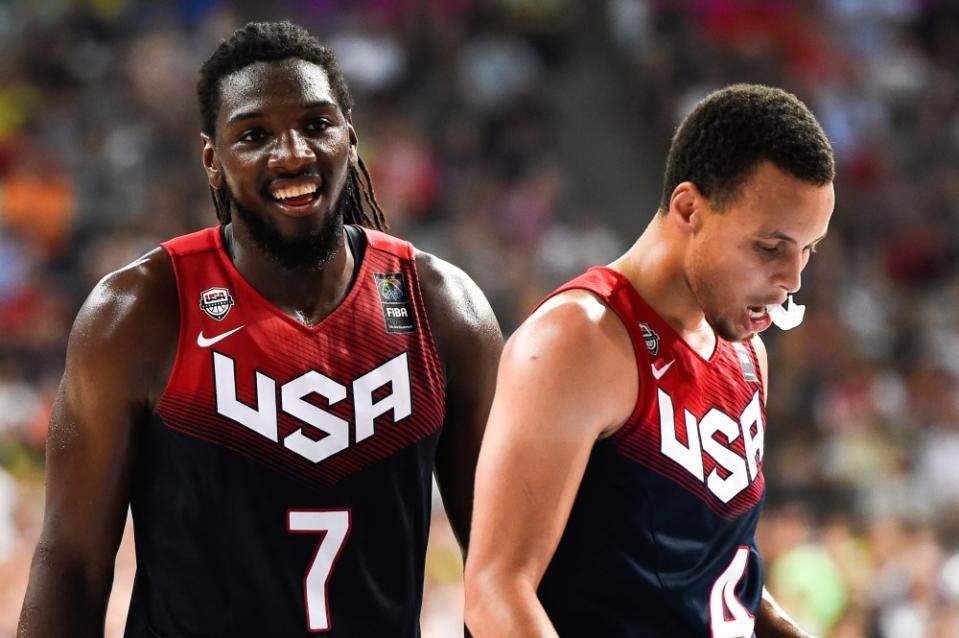
David Ramos/Getty Images
KF: Speak up more. Stop being afraid to speak. Don’t think because you’re working hard and doing everything right that people are still not going to judge you for not saying things that need to be said as a leader. When you’re the star player of a team and the guy who they’re hanging up all the posters for and all of that stuff, you have to step into that role of being a leader because they’re kind of forcing you into it. I didn’t try to force myself into it. I just tried to play my game. And it’s so happened that my game is being a leader, defensively, offensively and everything else that they wanted me to be. I just didn’t understand it at the time, because I had other guys in front of me who I thought should be more of the leader and should be the guy. At that time I didn’t understand, “Hey, doesn’t matter. When they tell you it’s your turn, step up and do it”.
What would you tell NBA teams right now about the sort of role you could provide for them on a rebuilding squad (like Rockets) or a contender (like Nuggets)?
KF: More so a team for the Rockets, I’d show these young guys, “Hey, we got to come in here and play hard every day, because this could be your last game.” You never know, especially with this NBA. If you’re not coming here, playing hard, practicing hard, focusing on getting better every day, and trying to win games and continue to build, then instantly you’ll be traded or kicked out of the league in general.
With a team like the Nuggets, it would be like “Hey, y’all know what you’re doing already. I’ve been here and we know what we could do. Let’s just keep doing what we’re doing.” I’m gonna just follow suit and play off of Joker [Nikola Jokic] and be setting screens for Jamal [Murray]. Instead of me being as shy, I can be more like, “Hey, pass me the ball, or come here, I’m gonna set this screen for you.” I already dived on the floor and did everything then like…I really don’t know, it’s just got to happen for me. I was there, and on the court, and I was always a fan favorite. When I step out there, I’m gonna get the fans involved. I’m gonna get my teammates involved. I’m gonna get the energy heightened. I just love playing the game.
The league has really gone away from having veterans on teams now. Back then, there used to be a bigger presence amongst older players on teams. What are your thoughts?
KF: It’s difficult to say for me, because when I was in the league, I had veterans. So for me, I had great leadership. And people telling me, “You’re a rookie. We’re going to put you through the rookie ringer. Here your backpack full of stuff. You got to carry this around.” That just gives you that mentality that, okay, I got to do stuff and earn my stripes before I could even talk to coach or maybe have the confidence that I really need. I got to earn my stripes. It made players compete that much harder because you got a vet that is playing maybe in front of you, or that may be coming behind you off the bench, and if you’re not doing right that vet is going to take your spot. So you got to focus that much, you got to listen to coach, you got to do the right stuff every day, in order to make your way and be seen.
Now it’s more, there’s only rookies. “We only worried about the rookies, we only worry about the second-year guy, a third-year guy. We’re not worried about him anymore because his contract is over with. Now he’s a vet he should know what he’s doing. Now we’re gonna worry about these other rookies.” The league landscape, you can see how those young rookie mistakes happen. They don’t understand the grind. Everybody in the NBA has talent, but they don’t understand the real grind and keep that talent that you get better and put your mark on the game.
The players would even speak up to the coaches saying, “Take this rookie out, he don’t know what he doing, we’re trying to win”. That’s what was the difference. I had moments where I was a rookie starting [and] playing bad, and the coach would instantly not play me no more for the rest of that half. Yeah, I may start the second half. But if I’m playing bad, still, I won’t play for the rest of the game. Because [as a coach, you’re thinking], “Hey, I got a veteran who’s wondering, I know what he’s going to do, and you’re going to make rookie mistakes. You’re not playing the way I want you to play”. That’s what I went through with experience.
And now it’s totally different landscape. It’s not even like that at all. Like if you making mistakes, it’s okay to let them play through it in some regard. But at the end of the day, you’re just going to keep taking now you’re just going to keep picking up first-round picks, picking frickin lottery picks. And that’s what’s happening.
[listicle id=1808734]
[listicle id=1754178]
[listicle id=1876713]
Story originally appeared on HoopsHype



